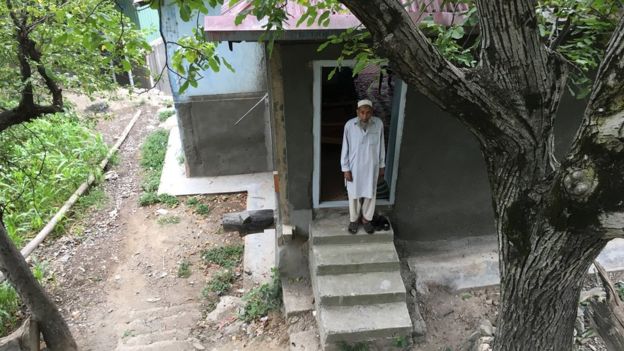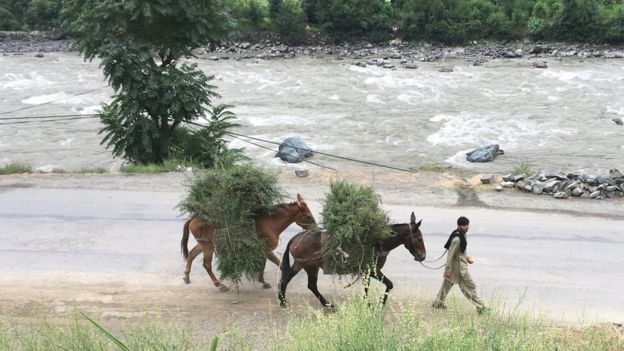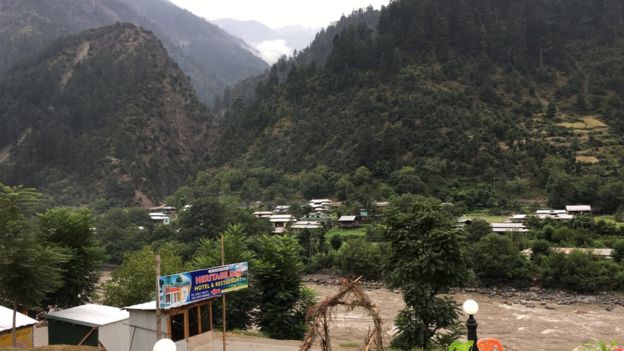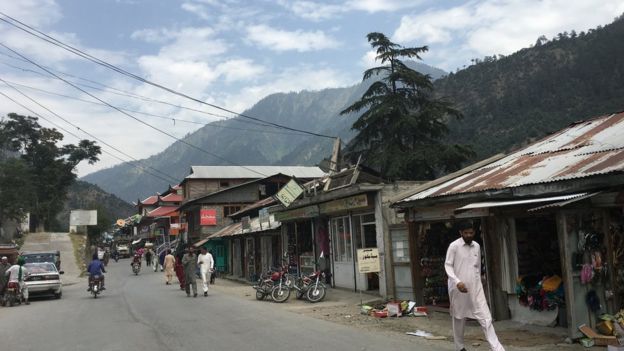I am 70: The shopkeeper who lived through Kashmir's wars

A Kashmiri shopkeeper who was born at the same time as Pakistan. Photo:BBC
The story of Mohammad Younus Butt is the story of Neelum Valley - a narrow river valley in north-western Kashmir.
Mr Butt s father died three months before his birth, leaving a widow, three more sons, a daughter and a two-acre farm.
He was born in Athmuqam, then a tiny, obscure village. A that time the former princely state of Kashmir was threatened with division and a newly-created
Pakistan was about to launch its first proxy invasion to annex it.
He has since lived through two more conflicts, and alternating spells of peace and confrontation.
"My mother told me that I was born in the month of Inqilab (revolution)," he says, using the term many Kashmiris use for partition.
"She told me it was just before the Hindu families in Keran and Tethwal started to flee across the (Neelum) river. The panic was caused by waves of armed Pathan tribal fighters who came up the river from Muzaffarabad."
These tribesmen were part of a larger tribal militia raised and armed by Pakistan that was to descend on Srinagar, the region s major city, from the north.
A year later, the fighting was over and Kashmir was effectively divided. Athmuqam, which fell on the Pakistani side, was left to carry on with its isolated pastoral existence.
Mr Butt s earliest memories are of a place where there was not much else to do beyond tending cattle or playing hide and seek on terraced farmlands.
"There was no school in the village, and hardly a literate person. If someone received a letter, they would take it to Keran (12km away), where there was a post office and they could find a clerk to read it for them."
If someone wanted to send a telegram, they had to travel to Teethwal, 50km away, where the only tele-printer in the entire valley was installed.
There was no road in the region and no transport. People used to travel on foot or on mules.

Mr Butt stayed in his house as conflict raged in the 1980s and 1990s. Photo: BBC
When he was about seven years old, his mother sent him to school. The primary school was 8km away and the middle school 4km beyond that.
"Life then was all about walking to school, walking back home, tending to cattle, helping on the farm, and finding time to play."
He left school when he failed grade seven. "But I had learned to read and write. I was among the first literate people in my village," he said.
Adulthood arrived with a bump in 1962, when several things happened.

Better transport links have changed life in the valley - but old ways remain. Photo: BBC
That year, he got married to his cousin, then his mother gave him money to set up a grocery shop, only to die a few months later.
"She gave me 520 rupees to start the shop - it was the third shop in Athmuqam."
In those days the road from Muzaffarabad came only as far as Nauseri, about 65km away. It was the nearest wholesale market.
"I brought six pony-loads of groceries on my first trip. We would walk the entire day from dawn to dusk to reach Nauseri. And it would take us two days to get home because the ponies needed to be rested."
He started to get involved in local politics, and was influenced by KH Khurshid, a respected politician appointed president of Pakistan-administered Kashmir in 1959 who was seen as a champion of Kashmiri rights.
But Mr Khurshid s career was short-lived, ending in 1964 when he fell out with the Pakistani establishment over the constitutional status of Kashmir, meaning the end of Mr Butt s political activism.
But 1964 was also the year Indian Prime Minister Jawaharlal Nehru died, and preparations for the second "tribal invasion" of Kashmir came, this time with local Kashmiris instead of tribal Pathans leading the guard, recruited by Pakistan. Pakistan s military has never officially confirmed it ever commissioned such a force.
"The policemen went from village to village recruiting Kashmiri youth. People would fall in line, and the chief police officer would walk down the queue, sizing up each individual. He would touch those he chose on the shoulder and ask them to step into a separate line."
The chief policeman patted Mr Butt on the shoulder.
"I told him I had a shop. He said all you need to do is accept the rifle and stay at home. I took the rifle. But weeks later they came and asked me to shut my shop and join training."
He and his fellow recruits spent three months training in Muzaffarabad s Nisar Camp. Most of them then infiltrated into Indian Kashmir, but some who could read and write were kept behind for clerical work at supply depots.
"I was posted at a camp in Athmuqam where I kept records of equipment and supplies. I was there until our forces were defeated in Kashmir, and India attacked Pakistan (on 6 September 1965)."
After the two countries signed a peace agreement in January 1966, the force was disbanded.
"Those who wanted to stay in the army stayed on, while the rest of us handed in our rifles and came home. I came home to my shop. It was still locked and there was merchandise in it."
After the war, people in Athmuqam discovered that Indian forces had moved closer and set up permanent posts on high ground opposite their village.
"Until then, our shepherds had always considered those areas our land. The same thing happened in several places down the valley."

Indian troops took high ground in Neelum Valley, with a devastating effect for its residents. Photo: BBC
For a while, peace prevailed. The road was gradually extended from Nauseri to Athmuqam, and further on. It was little better than the mule tracks it replaced, but it did bring transport and lifestyle changes for the area s growing population.
Athmuqam emerged as the main town in Neelum Valley. A general hospital and several schools were built, bank branches opened and a telephone exchange was set up.
"We built a new house, and all of my children - a boy and two girls - went to university," Mr Butt said.
But more conflict was to come, with the 1989 insurgency in Srinagar. Fresh hordes of private militiamen started to descend on Neelum Valley. This time the proxies were Islamic militants, organized by the Pakistani military to infiltrate Indian Kashmir.
The Indians, having occupied the valley s high ground in 1965, had the settlements in their rifle sights. As the conflict intensified, so did retaliatory fire from the Indians.
"I can t recall a worse time for Athmuqam. Everything that was built in 20 years was turned to rubble in 15 years of hostilities," he said.
The hospital was destroyed, and so were schools and colleges. Farming activity became impossible. Nearly all the population moved to safer areas, such as Muzaffarabad, or to gullies higher up which were not exposed to direct fire.
Only a handful of people remained to look after their own properties. Mr Butt was one of them.
"Athmuqam was a lonely place then. You couldn t find a soul to talk to. My brothers went away with their families, leaving their belongings in my care.
"In this neighbourhood only three households stayed behind. Our houses were damaged. We would eat and sleep in bunkers we had dug. Our orchards were destroyed.
"No children went to schools in those years. A whole generation missed out on education."
Over the last 14 years, since the 2003 ceasefire, much of the infrastructure has been rebuilt. A generation of educated young people are now adults and the government is trying to promote the area as a tourist destination.

Mr Butt has seen Athmuqam grow in times of peace. Photo: BBC
But peace is brittle. One incident of cross-border fire during the season scares the tourists away for months.
"Life has revived, but the danger is there all the time," he says.
Mr Butt says his "innings" is nearing its end. He has had three operations so far, two of them during the last three years.
But he is glad that business has grown, and Athmuqam has grown.
"I m lucky to have been born in freedom, and I hope our future generations will guard this freedom as a precious gift of God."
The story originally appeared on BBC


